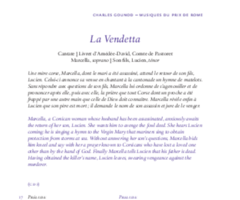La Vendetta
This short scène lyrique or cantata written for the Prix de Rome competition in 1838 is based on the concise narrative of a murder in working-class Corsica and the revenge exacted. Marcella learns from her son (Lucien) that his father, her husband, has been killed. After praying to God, Lucien vows to avenge him. According to Gérard Condé, this was a topical subject since on 8 December 1837, La Vendetta, an unpublished scène by Henri de Ruolz to words by Émilien Pacini, had been premiered at a concert at the Paris Opéra. Some time later, in 1840, Mérimée brought out Colomba, and Giovanni Pacini’s opera, La Fidanzata Corsa, was given its premiere in 1842. Gounod used this quasi naturalistic storyline, which was very similar to other melodramatic subjects of the period, as a spur to his creativity, showing real skill in the process. The orchestral prelude, with its use of the augmented fourth, fluctuates between a pastoral mood and forebodings of motherly angst. The main scene sung by Marcella, a lyric soprano with a great deal to do in her upper registers, gives the performer the opportunity to show off not only her musicality and her talent as a singer but also her skill as an actress. In line with French tradition, the declamation remains close to the spoken word, and the rhythm of the music is not interrupted by pointless repetitions of the text. Lucien’s entry occurs in the distance (or a conceptual distance, since the cantata was not written to be performed on stage which would make any distanced effect possible). His popular song is commented on “downstage” by his mother who hears him approaching. The beautiful prayer for two voices which is sung at that moment already demonstrates Gounod’s talent when it came to praising God. Effects in the brass and tension in the string writing, among other things, also show that the young composer had made real progress in his skill as an orchestrator. The final duet corresponds to the more modern aesthetics of Romantic opera with its intersecting vocal lines, extreme heroism and an agogic progression leading to a highly effective concluding presto. Although the cantata seemed to have all the elements for success, “it was a failure! I was twenty years old, the age for conscription! But my prize from the previous year earned me a deferral of one year. So I still had the chance to win a third and final competition.” (Gounod, Mémoires d’un artiste.)

